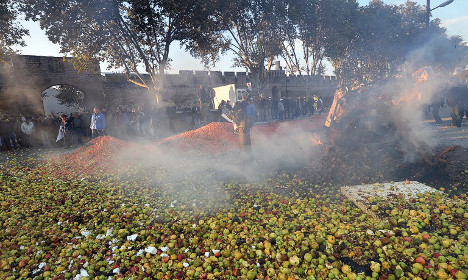Why do French strikers throw food?
“How come French babies sleep through the night?” “Why do French children happily eat what is put in front of them?” Such topics have been quite the fascination for us Anglo-Saxons of late.
Books about how the French raise such well-behaved children are legion. A host of best-sellers are revealed after a quick glance at Amazon (independent book sellers I mean you no offence, it was simply faster). “French Children Don’t Throw Food”, “Why French children don’t talk back”, “French Kids Eat Everything”, “French Parents Don’t Give In”.
A veritable cottage industry has emerged as French mothers preach how their superior parenting skills are a gift to the world and the solution to producing a generation of better behaved citizens.
Switching attention away from Amazon to any news site recently however will reveal a host of French adults who do not seem to be as well behaved as their infant brethren. Within the last week we have seen French tobacconists dumping tonnes of carrots in Paris, French farmers barricading the borders, striking ferry workers blocking train-lines to name just three.
Where did it all go so wrong for these once impeccably-mannered ‘citoyens’?

(Farmers leave apples during a protest in Avignon. Photo. AFP)
Having read several of these books on why the French make such great parents, it boils down to the need to impose strict boundaries from the start. Do not rush to give attention to a crying baby, don’t replace a toddler’s plate with something different. In a nutshell, be cruel to be kind.
Relax – you know what is best for you and for baby, whatever the protest at that moment. Stick to your guns or the future is going to get worse. According to the books, this comes as second nature to French parents, which in most cases tends to mean French mothers (more on this later).
When only last week France’s farmers were on the streets again, scarcely had they started to wreak chaos that the government announced fresh subsidies and loan cancellations to the tune of €500 million.
Not even a mention of the urgent reforms required in the French agricultural sector. In parenting terms this was the equivalent of reaching straight for the Kinder eggs.
It is however simply following type, and repeats years of similar climb downs. If you are a French tax-payer, read the small print on your tax return; there are special exemption cases galore for everyone from farmers to fishermen. All hard-earned by protestors at some point in the last 30 years.
Those same tobacconists who were dumping tonnes of carrots in Paris last week have benefited from billions of euros in state aid over the last ten years and seen their average incomes rise massively as a result. And yet, like spoilt children, they still scream and shout and demand more.

(Farmers throw milk and fruit on the ground in July, in Lyon. Photo: AFP)
You‘ll see where I am going with this. As individuals running households, French parents manage to make the sorts of smart decisions which their politicians are incapable of doing.
Children who learn good lessons at home and reach adulthood the better for it, soon realize that the reality of French working life is that it is easier (and more lucrative) to unlearn those lessons. French workers are encouraged by striking rights enshrined in law, a unionized police force who will not mobilize against strikers and, above all, by seeing all the concessions which have been wrung out of successive governments by the actions of others in their situation.
My advice for what remains a predominantly male-dominated political class who tackle these disputes is to look for solutions closer to home. Ask their partners how they would handle their own children, or for the more enlightened among them, apply some of the parenting skills they use at home themselves.
No knee-jerk reactions to the first night of crying and certainly no reaching for the cheque book as soon as the first carrots hit the pavement. Think of the long game, and don’t forget that a bit of resistance is quite normal. Don’t rush for that quick fix, however tempting it might be in the short-term. Generations of parents have shown you the way forward. Be strong!
I admit, the first few strikes tackled in this way might not be too pretty, but just like with that crying infant, a bit of strength at the right time saves countless sleepless nights in the future. Your neighbours happily forgave you for their lost sleep because they understood what was going on.
The French electorate would show similar respect. Who knows, in a few years time we might be reading books on French labour relations not French babies, as we ask how come their strikers don’t throw food anymore?
Martin Dixon is a Director of the Franco-British Chamber of Commerce and Industry (FBCCI) writing in a personal capacity, and his opinions do not reflect those of the FBCCI or any other organization with which he is connected. THis opinion was first published here. For more information about the FBCCI, click here.


 Please whitelist us to continue reading.
Please whitelist us to continue reading.
Member comments